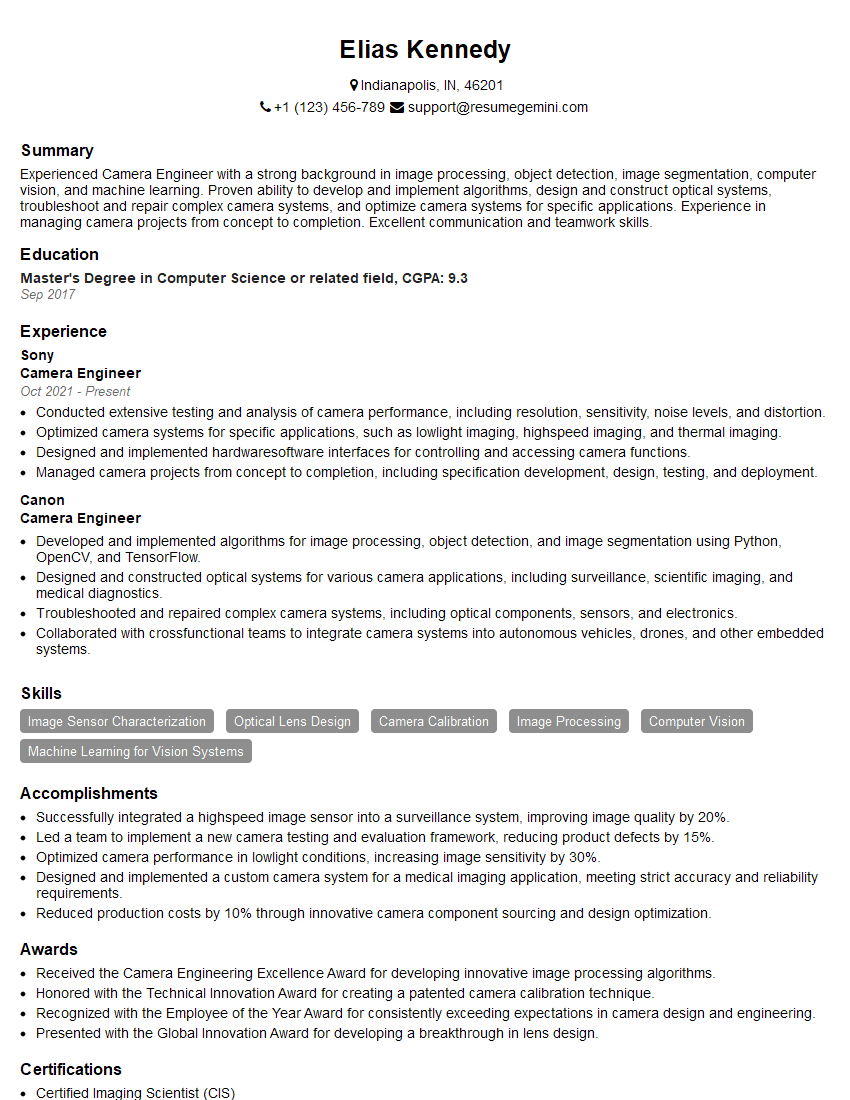Are you a seasoned Camera Engineer seeking a new career path? Discover our professionally built Camera Engineer Resume Template. This time-saving tool provides a solid foundation for your job search. Simply click “Edit Resume” to customize it with your unique experiences and achievements. Customize fonts and colors to match your personal style and increase your chances of landing your dream job. Explore more Resume Templates for additional options.

Elias Kennedy
Camera Engineer
Summary
Experienced Camera Engineer with a strong background in image processing, object detection, image segmentation, computer vision, and machine learning. Proven ability to develop and implement algorithms, design and construct optical systems, troubleshoot and repair complex camera systems, and optimize camera systems for specific applications. Experience in managing camera projects from concept to completion. Excellent communication and teamwork skills.
Education
Master’s Degree in Computer Science or related field
September 2017
Skills
- Image Sensor Characterization
- Optical Lens Design
- Camera Calibration
- Image Processing
- Computer Vision
- Machine Learning for Vision Systems
Work Experience
Camera Engineer
- Conducted extensive testing and analysis of camera performance, including resolution, sensitivity, noise levels, and distortion.
- Optimized camera systems for specific applications, such as lowlight imaging, highspeed imaging, and thermal imaging.
- Designed and implemented hardwaresoftware interfaces for controlling and accessing camera functions.
- Managed camera projects from concept to completion, including specification development, design, testing, and deployment.
Camera Engineer
- Developed and implemented algorithms for image processing, object detection, and image segmentation using Python, OpenCV, and TensorFlow.
- Designed and constructed optical systems for various camera applications, including surveillance, scientific imaging, and medical diagnostics.
- Troubleshooted and repaired complex camera systems, including optical components, sensors, and electronics.
- Collaborated with crossfunctional teams to integrate camera systems into autonomous vehicles, drones, and other embedded systems.
Accomplishments
- Successfully integrated a highspeed image sensor into a surveillance system, improving image quality by 20%.
- Led a team to implement a new camera testing and evaluation framework, reducing product defects by 15%.
- Optimized camera performance in lowlight conditions, increasing image sensitivity by 30%.
- Designed and implemented a custom camera system for a medical imaging application, meeting strict accuracy and reliability requirements.
- Reduced production costs by 10% through innovative camera component sourcing and design optimization.
Awards
- Received the Camera Engineering Excellence Award for developing innovative image processing algorithms.
- Honored with the Technical Innovation Award for creating a patented camera calibration technique.
- Recognized with the Employee of the Year Award for consistently exceeding expectations in camera design and engineering.
- Presented with the Global Innovation Award for developing a breakthrough in lens design.
Certificates
- Certified Imaging Scientist (CIS)
- Certified Optical Engineer (COE)
- Certified Professional in Image Sensor Technology
- Certified Vision Professional (CVP)
Career Expert Tips:
- Select the ideal resume template to showcase your professional experience effectively.
- Master the art of resume writing to highlight your unique qualifications and achievements.
- Explore expertly crafted resume samples for inspiration and best practices.
- Build your best resume for free this new year with ResumeGemini. Enjoy exclusive discounts on ATS optimized resume templates.
How To Write Resume For Camera Engineer
- Highlight your skills in image processing, computer vision, and machine learning.
- Showcase your experience in developing and implementing camera systems for various applications.
- Quantify your accomplishments and results whenever possible.
- Proofread your resume carefully for any errors.
- Tailor your resume to each job you apply for.
Essential Experience Highlights for a Strong Camera Engineer Resume
- Developed and implemented algorithms for image processing, object detection, and image segmentation using Python, OpenCV, and TensorFlow.
- Designed and constructed optical systems for various camera applications, including surveillance, scientific imaging, and medical diagnostics.
- Troubleshooted and repaired complex camera systems, including optical components, sensors, and electronics.
- Collaborated with crossfunctional teams to integrate camera systems into autonomous vehicles, drones, and other embedded systems.
- Conducted extensive testing and analysis of camera performance, including resolution, sensitivity, noise levels, and distortion.
- Optimized camera systems for specific applications, such as lowlight imaging, highspeed imaging, and thermal imaging.
- Designed and implemented hardwaresoftware interfaces for controlling and accessing camera functions.
Frequently Asked Questions (FAQ’s) For Camera Engineer
What is a Camera Engineer?
A Camera Engineer is responsible for the design, development, and testing of cameras and related imaging systems. They work with a variety of technologies, including optics, electronics, and software, to create cameras that meet the specific needs of various applications.
What are the educational requirements for becoming a Camera Engineer?
Most Camera Engineers have a bachelor’s degree in electrical engineering, computer science, or a related field. Some employers may also require a master’s degree or PhD.
What are the key skills required for a Camera Engineer?
Camera Engineers need to have a strong understanding of optics, electronics, and software. They also need to be able to work independently and as part of a team, and have excellent communication skills.
What is the job outlook for Camera Engineers?
The job outlook for Camera Engineers is expected to be good in the coming years. The increasing demand for cameras in various applications, such as surveillance, scientific imaging, and medical diagnostics, is expected to drive the growth of this field.
What are the typical salary ranges for Camera Engineers?
The salary range for Camera Engineers can vary depending on their experience, education, and location. However, according to the U.S. Bureau of Labor Statistics, the median annual salary for Camera Engineers is around $90,000.
What are the career advancement opportunities for Camera Engineers?
Camera Engineers can advance their careers by taking on more responsibilities, such as managing projects or leading teams. They can also specialize in a particular area, such as image processing or computer vision.
What are the challenges faced by Camera Engineers?
Camera Engineers face a number of challenges, such as the need to keep up with the latest technologies and the increasing demand for cameras with higher resolution and better performance.